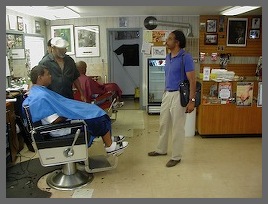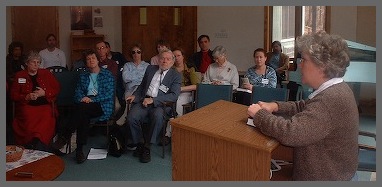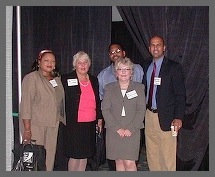Expanding Your Network
As you meet other activists or potential volunteers, share what you've been doing. Early activities include writing letters to newspapers (editorials, or guest editorials), distributing informational literature, and contacting legislators by mail and phone. During this work, you are likely to meet people with great enthusiasm for the cause and have skills useful for beginning and growing the group.

Candidate for US Senate Aaron Dixon, Spokane, WA 2006
To make initial contact with local people, it’s helpful to get an introduction from a mutual acquaintance. If not possible, send a letter or email of introduction, or call an appointment to meet in public. Tell this person how you heard of his/her work or organizational affiliation, and if someone referred you, remember to mention this person's name.
Enclosing a flyer, and website to refer to is fine. It’s not a good idea to send a stack of material to someone who hasn't asked for it. Remember -- less is more when making an introduction. Unsolicited mail should be brief and always respectful.

Journey for Justice: Hillsborough, NC 2003
If you've scheduled a meeting with an individual or another group, organize your thoughts beforehand so time will be used wisely. Share a little 'small talk,’ but don’t hesitate to get down to business. Explain or repeat your reason for meeting, whether you're asking for information (such as names of other people to contact), offering to help them, or proposing to collaborate on a particular event or project.
Agree on the next steps, if any, before the meeting is over. Always conclude by thanking the people (or individual) present for their time, interest and support. Ask for business card(s), and try to have one made identifying you. November Coalition printer-ready artwork is available online. Office supply companies can access and create business cards for a nominal fee.
Remember to meet strangers in safe and public places. Be smart.
Be open to meeting with people who want to meet you. If you haven't held a meeting of everyone you’ve met, it's time.
Meetings can be casual, informal, or formal affairs, and there’s a lot of ground in between.

Congressional Black Caucus meeting, 2006
Meetings can be infrequent, but plan enough face to face opportunities to keep local supporters connected.
Though it may seem obvious, you must be interested in people in every way, not just as people you need something from. Ask how things are going in this person's life. Where there is a major achievement, recognize it. Where there’s disappointment, offer support. Try to pair up volunteers who might need extra support. Spread yourselves around. Activism sometimes means 'lending an ear' to a troubled friend, a compassionate awareness of our common humanity.
Encourage volunteers with reasonable expectations. Remember, always, to consider the financial pressures on single parents, and time constraints of all volunteers. No one should feel guilty for volunteering any time that's been offered.
As you meet other activists or potential volunteers, share what you've been doing. Early activities include writing letters to newspapers (editorials, or guest editorials), distributing informational literature, and contacting legislators by mail and phone. During this work, you are likely to meet people with great enthusiasm for the cause and have skills useful for beginning and growing the group.

Candidate for US Senate Aaron Dixon, Spokane, WA 2006
Enclosing a flyer, and website to refer to is fine. It’s not a good idea to send a stack of material to someone who hasn't asked for it. Remember -- less is more when making an introduction. Unsolicited mail should be brief and always respectful.

Journey for Justice: Hillsborough, NC 2003
Agree on the next steps, if any, before the meeting is over. Always conclude by thanking the people (or individual) present for their time, interest and support. Ask for business card(s), and try to have one made identifying you. November Coalition printer-ready artwork is available online. Office supply companies can access and create business cards for a nominal fee.
Remember to meet strangers in safe and public places. Be smart.
Be open to meeting with people who want to meet you. If you haven't held a meeting of everyone you’ve met, it's time.
Meetings can be casual, informal, or formal affairs, and there’s a lot of ground in between.

Congressional Black Caucus meeting, 2006
Though it may seem obvious, you must be interested in people in every way, not just as people you need something from. Ask how things are going in this person's life. Where there is a major achievement, recognize it. Where there’s disappointment, offer support. Try to pair up volunteers who might need extra support. Spread yourselves around. Activism sometimes means 'lending an ear' to a troubled friend, a compassionate awareness of our common humanity.
Encourage volunteers with reasonable expectations. Remember, always, to consider the financial pressures on single parents, and time constraints of all volunteers. No one should feel guilty for volunteering any time that's been offered.